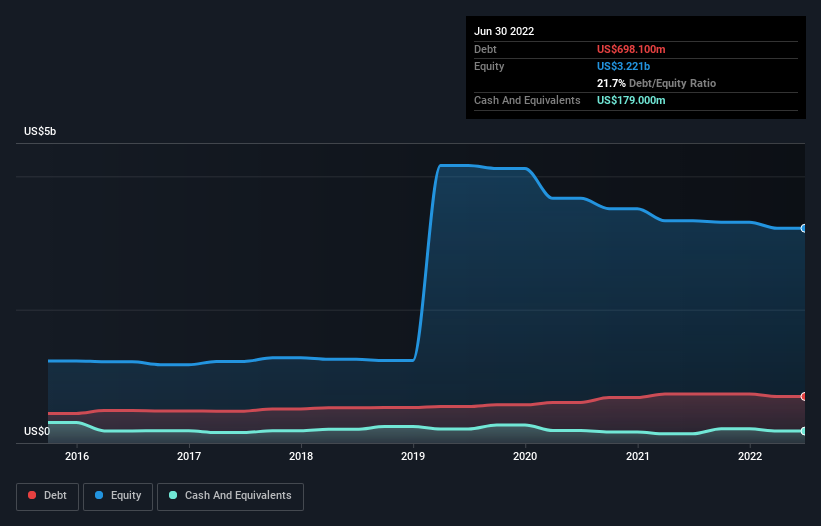- Singapore
- /
- Hospitality
- /
- SGX:M04
Here's Why Mandarin Oriental International (SGX:M04) Can Afford Some Debt

The external fund manager backed by Berkshire Hathaway's Charlie Munger, Li Lu, makes no bones about it when he says 'The biggest investment risk is not the volatility of prices, but whether you will suffer a permanent loss of capital.' When we think about how risky a company is, we always like to look at its use of debt, since debt overload can lead to ruin. We note that Mandarin Oriental International Limited (SGX:M04) does have debt on its balance sheet. But the more important question is: how much risk is that debt creating?
When Is Debt A Problem?
Debt is a tool to help businesses grow, but if a business is incapable of paying off its lenders, then it exists at their mercy. In the worst case scenario, a company can go bankrupt if it cannot pay its creditors. However, a more frequent (but still costly) occurrence is where a company must issue shares at bargain-basement prices, permanently diluting shareholders, just to shore up its balance sheet. Of course, plenty of companies use debt to fund growth, without any negative consequences. The first step when considering a company's debt levels is to consider its cash and debt together.
Check out our latest analysis for Mandarin Oriental International
How Much Debt Does Mandarin Oriental International Carry?
As you can see below, Mandarin Oriental International had US$698.1m of debt at June 2022, down from US$735.1m a year prior. However, it does have US$179.0m in cash offsetting this, leading to net debt of about US$519.1m.

How Strong Is Mandarin Oriental International's Balance Sheet?
We can see from the most recent balance sheet that Mandarin Oriental International had liabilities of US$227.5m falling due within a year, and liabilities of US$805.9m due beyond that. Offsetting this, it had US$179.0m in cash and US$66.4m in receivables that were due within 12 months. So it has liabilities totalling US$788.0m more than its cash and near-term receivables, combined.
This deficit isn't so bad because Mandarin Oriental International is worth US$2.50b, and thus could probably raise enough capital to shore up its balance sheet, if the need arose. But we definitely want to keep our eyes open to indications that its debt is bringing too much risk. When analysing debt levels, the balance sheet is the obvious place to start. But it is future earnings, more than anything, that will determine Mandarin Oriental International's ability to maintain a healthy balance sheet going forward. So if you're focused on the future you can check out this free report showing analyst profit forecasts.
In the last year Mandarin Oriental International wasn't profitable at an EBIT level, but managed to grow its revenue by 118%, to US$414m. So its pretty obvious shareholders are hoping for more growth!
Caveat Emptor
While we can certainly appreciate Mandarin Oriental International's revenue growth, its earnings before interest and tax (EBIT) loss is not ideal. Indeed, it lost US$15m at the EBIT level. When we look at that and recall the liabilities on its balance sheet, relative to cash, it seems unwise to us for the company to have any debt. So we think its balance sheet is a little strained, though not beyond repair. We would feel better if it turned its trailing twelve month loss of US$3.8m into a profit. So to be blunt we do think it is risky. For riskier companies like Mandarin Oriental International I always like to keep an eye on the long term profit and revenue trends. Fortunately, you can click to see our interactive graph of its profit, revenue, and operating cashflow.
Of course, if you're the type of investor who prefers buying stocks without the burden of debt, then don't hesitate to discover our exclusive list of net cash growth stocks, today.
New: Manage All Your Stock Portfolios in One Place
We've created the ultimate portfolio companion for stock investors, and it's free.
• Connect an unlimited number of Portfolios and see your total in one currency
• Be alerted to new Warning Signs or Risks via email or mobile
• Track the Fair Value of your stocks
Have feedback on this article? Concerned about the content? Get in touch with us directly. Alternatively, email editorial-team (at) simplywallst.com.
This article by Simply Wall St is general in nature. We provide commentary based on historical data and analyst forecasts only using an unbiased methodology and our articles are not intended to be financial advice. It does not constitute a recommendation to buy or sell any stock, and does not take account of your objectives, or your financial situation. We aim to bring you long-term focused analysis driven by fundamental data. Note that our analysis may not factor in the latest price-sensitive company announcements or qualitative material. Simply Wall St has no position in any stocks mentioned.
About SGX:M04
Mandarin Oriental International
Engages in the ownership and operation of hotels, resorts, and residences in Asia, Europe, the Middle East, Africa, and the Americas.
Excellent balance sheet with weak fundamentals.
Similar Companies
Market Insights
Community Narratives



